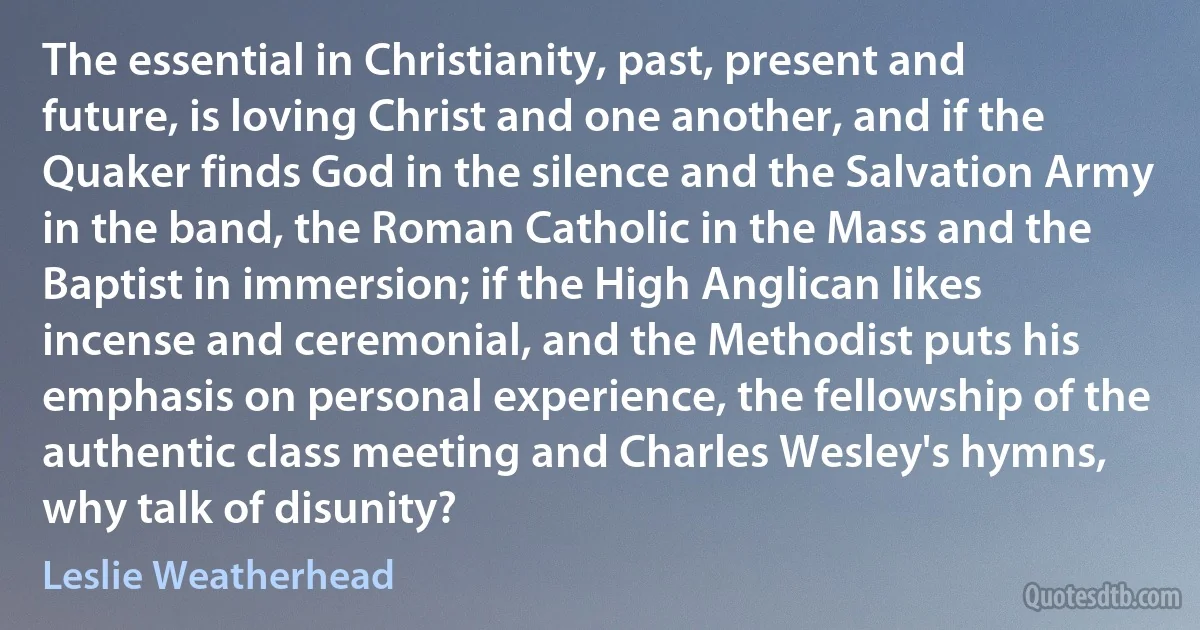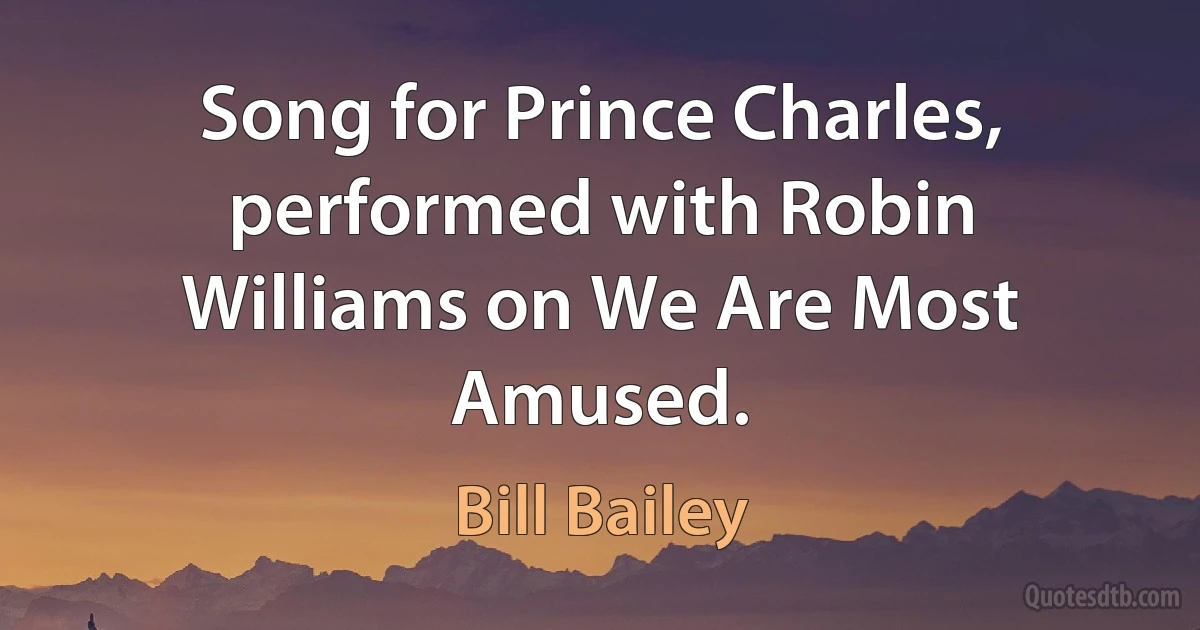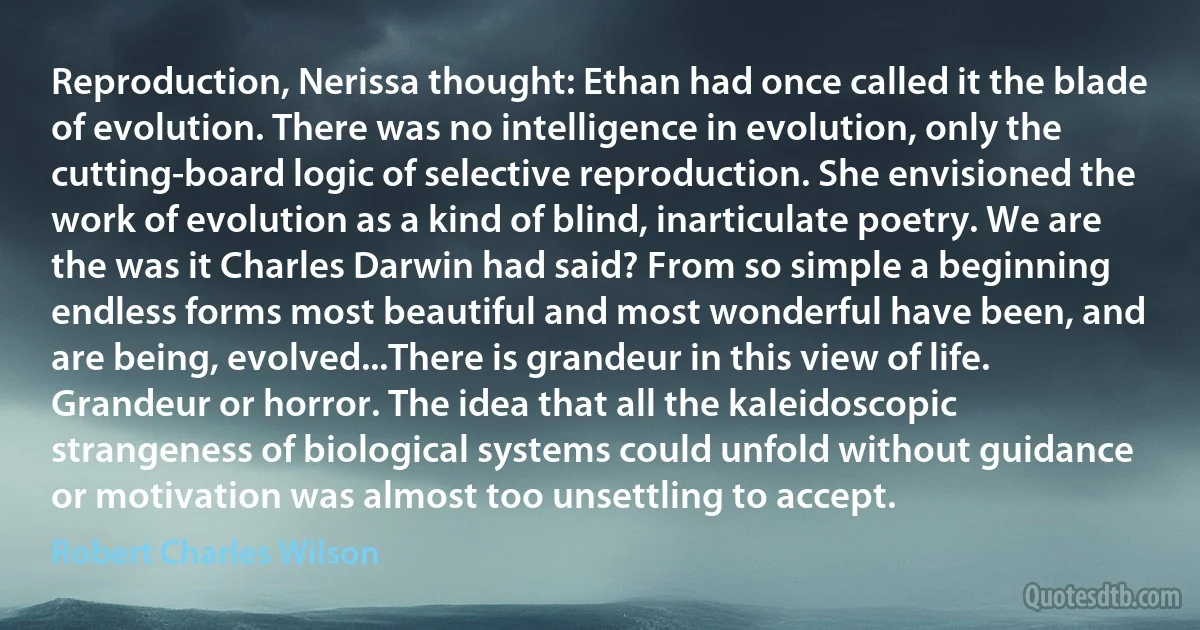Charles Quotes - page 12
Charles: This is the Imus in the Morning radio program.
Imus: I'm hearin' you baby.
Charles: Yeah!
Imus: Where we at?
Charles: On WFAN New York.
Imus: Hear that.
Charles: You know what I'm sayin'?
Imus Yeah.
Charles: Seven o'clock Eastern Time, and time
ImusWhy are we talking like fourteen year old black children?
Charles Because we're racist?
Imus: Yes. Yeah.
Charles: Because we're stupid?
Imus: Beyond stupid. Senile and stupid. And lame
Charles: Oh, please. Good lord.

Don Imus
This much is certain. If the present Democratic leadership is right, then Calhoun and Jefferson Davis were wrong. If the present Democratic leadership is right, then Thaddeus Stevens and Charles Sumner were right, and Lee, Forrest, and Wade Hampton were wrong. If the President's civil-rights program is right, then reconstruction was right. If this program is right, the carpetbaggers were right.

James Eastland
Both the existence of these parallels and their tragic nature would not have escaped Charles Kindleberger, whose World in Depression, 1929-1939 was published exactly 40 years ago, in 1973. Where Kindleberger's canvas was the world, his focus was Europe. While much of the earlier literature, often authored by Americans, focused on the Great Depression in the US, Kindleberger emphasised that the Depression had a prominent international and, in particular, European dimension. It was in Europe where many of the Depression's worst effects, political as well as economic, played out. And it was in Europe where the absence of a public policy authority at the level of the continent and the inability of any individual national government or central bank to exercise adequate leadership had the most calamitous economic and financial effects.

Barry Eichengreen
Think of it: the lowest common denominator in being digital is not your operating system, modem, or model of computer. It's a tiny piece of plastic, designed decades ago by Bell Labs' Charles Krumreich, Edwin Hardesty, and company, who thought they were making an inconspicuous plug for a few telephone handsets. Not in their wildest dreams was Registered Jack 11 - a modular connector more commonly known as the RJ-11 - meant to be plugged and unplugged so many times, by so many people, for so many reasons, all over the world.

Nicholas Negroponte
But is this wonder the real thing? At first glance, it wouldn't seem to be: a transcendence that's chemically induced must surely be fake. Artificial Paradises was what Charles Baudelaire called his 1860 book about his experiences with hashish, and that sounds about right. Yet what if it turns out that the neurochemistry of transcendence is no different whether you smoke marijuana, meditate or enter a hypnotic trance by way of chanting, fasting, or prayer? What if in every one of these endeavors, the brain is simply prompted to produce large quantities of cannabinoids, thereby suspending short-term memory and allowing us to experience the present deeply?...From a brain's point of view, the distinction between a natural and an artificial high may be meaningless.

Michael Pollan
Mrs. Lane and I took our journey towards Bristol, resolving to lie at a place called Long Marson, in the vale of Esham.
But we had not gone two hours on our way but the mare I rode on cast a shoe; so we were forced to ride to get another shoe at a scattering village, whose name begins with something like Long-. And as I was holding my horse's foot, I asked the smith what news? He told me that there was no news that he knew of, since the good news of the beating of the rogues the Scots. I asked him whether there was none of the English taken that joined with the Scots? He answered, that he did not hear that that rogue Charles Stewart was taken; but some of the others, he said, were taken, but not Charles Stewart. I told him, that if that rogue were taken he deserved to be hanged, more than all the rest, for bringing in the Scots. Upon which he said, that I spoke like an honest man, and so we parted.

Charles II of England
As Charles Black stated in his highly regarded work on impeachment, the two specific impeachable offenses--treason and bribery--can help identify both the 'ordinary crimes which ought also to be looked upon as impeachable offenses, and those serious misdeeds, not ordinary crimes, which ought to be looked on as impeachable offenses..." Using treason and bribery as "the miners' canaries," Professor Black states that "high crimes and misdemeanors, in the constitutional sense, ought to be held to be those offenses which are rather obviously wrong, whether or not 'criminal,' and which so seriously threaten the order of political society as to make pestilent and dangerous the continuance in power of their perpetrator."

Ted Kennedy
The Roman Catholic Church has withstood in Europe and in Ireland the fiercest storms. In France it has survived Voltaire and Lepaux, the French Revolution and the Goddess of Reason; in England, Queen Elizabeth, William the Third, and the Penal Laws. In Ireland it still confronts us with four times as many adherents as all the Protestant churches. If we look to the fate of sovereigns, we find that James the Second forfeited the crown of England, and that Charles the Tenth sacrificed the crown of France, rather from devotion to the Church of Rome than from the failure of their political ambition.

John Russell, 1st Earl Russell
Charles Lamb, in one of his most delightful essays, sets high worth on the observance of All Fools' Day, because it says to a man: "You look wise. Pray correct that error!" Christmas brings the universal message to men: "You look important and great; pray correct that error." It overturns the false standards that have blinded the vision and sets up again in their rightful magnitude those childlike qualities by which we enter the Kingdom.
Christmas turns things inside out. Under the spell of the Christmas story the locked up treasures of kindliness and sympathy come from the inside of the heart, where they are often kept imprisoned, to the outside of actual expression in deed and word. ... It is the vision of the Christ-child which enables all men to get at the best treasures of their lives and offer them for use.

Halford E. Luccock
When the political history of the Blair era is written, it may well be concluded that the most effective conservative opposition came not from politicians, but journalists. It often seems that the charge against New Labour is led by the Telegraph and Spectator, by Charles Moore and Boris Johnson, or from some Murdoch journalists, rather than by William Hague. So perhaps it should not comes [sic] as a complete surprise that the most sustained, internally logical and powerful attack on Tony Blair and all his works should be a polemic by a right-wing journalist, Peter Hitchens, rather than a Tory pamhlet or an MP's speech. ...
On much of this agenda, Hitchens is simply out of time. ... [T]he idea of a widespread return to a belief in literal damnation, to public hostility towards homosexuals and the shaming of single mothers, seems utterly implausible.

Peter Hitchens
You get the picture. And so did BMW. When they bought the company they could have fitted a new body to one of their 7 Series. That's what Mercedes did to create the Maybach. But instead of wandering around the BMW spare-parts division saying, "What do we want?" the engineers fired up their computers and asked, "What do we need?". Plainly they looked at what Henry Royce and Charles Rolls were trying to achieve a hundred years ago, and thought, "Zis is vot ve must do also." And as a result the Rolls-Royce Phantom is quite simply the best car in the world.

Jeremy Clarkson
It is from the shadow of a cloister that there emerges one of mankind's greatest very greatest scourges. Luther appears; Calvin follows him. The Peasants' Revolt; the Thirty Years' War; the civil war in France; the massacre of the Low Countries; the massacre of Ireland; the massacre of the Cévennes; St Bartholomew's Day; the murders of Henry II, Henry IV, Mary Stuart, and Charles I; and finally, in our day, from the same source, the French Revolution.

Joseph de Maistre
A correspondent, Captain Charles Christie R.E., to whom I have shown these sections after they were printed, objects reasonably enough that commodity should not have been represented by M, or Mass, but by some symbol, for instance Q, which would include quantity of space or time or force, in fact almost any kind of quantity.

William Stanley Jevons
Let there be light, says the Bible. All the firmaments of technology, all our computers and networks, are built with light, and of light, and for light, to hasten its spread around the world. Light glows on the telescom's periphery; it shines as its core; it illuminates its webs and its links. From Newton, Maxwell, and Einstein to Richard Feynman and Charles Townes, the more men have gazed at light, the more it turns out to be a phenomenon utterly different from anything else. And yet everything else - every atom and every molecula - is fraught with its oscillating intensity.

George Gilder



